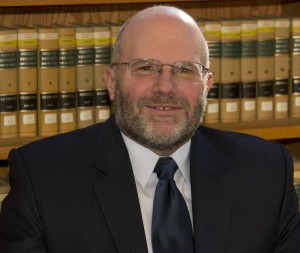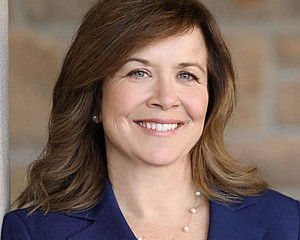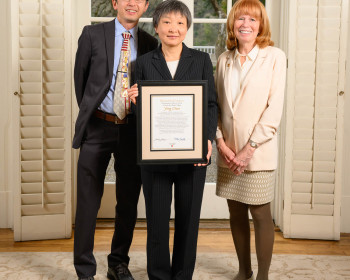Doug Beloof Leaves a Lasting Impact on Crime Victims’ Rights
Doug Beloof, Professor of Law and Secretary of the National Crime Victim Law Institute (NCVLI), retired this summer. He has been a staunch and compassionate advocate of crime victims’ rights for almost 40 years, coming onto the criminal justice scene as a young prosecutor in the 1980s when crime victims’ rights were just beginning to be publicly discussed.
Open gallery

Doug Beloof, Professor of Law and Secretary of the National Crime Victim Law Institute (NCVLI), retired this summer. He has been a staunch and compassionate advocate of crime victims’ rights for almost 40 years, coming onto the criminal justice scene as a young prosecutor in the 1980s when crime victims’ rights were just beginning to be publicly discussed.
Beloof likes to say that his work “stands on the shoulders of giants,” referring to the victims who began to change the criminal justice process. “Bob and Dee Dee Kouns were the Oregon pioneers in victims’ rights. They lost their daughter to murder, and like thousands of grieving families across the United States, they became part of a nationwide victims’ rights movement,” Beloof recalls.
He credits Professor Susan Mandiberg, Doug Newell, and then-Dean James Huffman for hiring him at Lewis & Clark Law School and giving him time to write the first casebook in the field of victims’ rights. Victims and Criminal Procedure won a national award for writing in victimology and the law. Since then, Beloof has published numerous articles about civil rights for crime victims, as well as the book Victims’ Rights: A Documentary and Reference Guide. He has received awards from The United States Attorney General, Mothers Against Drunk Driving, and the National Organization for Victim Assistance.
In 1998, the National Crime Victim Law Institute (NCVLI) was imagined, as all good ideas are, in a hotel bar on a cocktail napkin. Beloof, crime victims attorney Steve Twist, and then-professor Paul Cassell collaborated to bring that scrawled proposal to life.
Close friend and colleague of Beloof, Emeritus Dean and Professor of Law Jim Huffman, spoke at his retirement party and recounted—between witty ‘roasts’—the story of how Beloof forged the way in crime victim’s rights. “In the very early days I traveled with Doug to Washington, DC, where we met with all manner of important people to whom Doug pitched his vision of the National Crime Victim Law Institute,” Huffman said. “They bought in and the rest is history. Doug achieved then what even he might not be able to do today – he persuaded a democrat, Diane Feinstein, and a republican, Jon Kyl, to be his leading sponsors.”
Senators Feinstein and Kyl helped Beloof secure crucial funding to launch NCVLI. Then, when Military Veteran and former L.A. Police Officer John Gillis became the head of the Office for Victims of Crime in the U.S. Justice Department, he issued a funding solicitation that was awarded to NCVLI to sponsor crime victims’ rights clinics in select jurisdictions. Gillis’ only daughter had been murdered in a gang initiation in 1979.
Despite funding, Beloof had another major hurdle to jump. In 1999, when he convened all of the lawyers in the country who did victims’ rights work in criminal courts, there were a total of 12 lawyers including him. Attorneys who did work specifically on violence against women numbered just 10.
“What Doug has been doing, in essence, is brick-by-brick building a new criminal justice system,” Executive Director of NCVLI and Clinical Professor of Law Meg Garvin said. “A system that treats victims with dignity and respect and honors their rights as legal rights rather than mere words on paper. It is truly amazing.”
Beloof is equally fond of the work that Garvin has done for the institute. “My best decision was hiring Meg Garvin, who replaced me as Director of the institute.” The first NCVLI conference had about 50 attendees. This year, the conference gathered close to 450 attorneys and advocates from across the country.
Beyond founding an organization and publishing groundbreaking scholarship, Beloof has worked with Congress. He helped secure the passage of the Federal Crime Victims’ Rights Act, 18 USC Sec. 3771, which amended the federal criminal code to give crime victims the rights to confer with prosecutors, to have timely notice of hearings, to be heard on issues of release, plea and sentencing, and to receive “full and timely” restitution.
“Among the best things that Doug has taught me and that I try to pass along is that advancing victims’ rights requires fighting hard to secure legal victories but always being prepared to lose well; meaning that even when you ‘lose,’ if you did things right you simply know that your next step is to go back to the legislature to improve the law,” Garvin said.
He began his law career clerking for Justice Thomas H. Tongue of the Oregon Supreme Court. He has been a prosecutor and a criminal defense attorney. As director of the Multnomah County Victims’ Assistance Program, he worked on establishing procedures to assist victims of crime, including a domestic violence program and multidisciplinary teams to deal with child abuse. He has lectured nationally and internationally on victim law, testified in front of Congressional judiciary committees, and has been cited by the Senate Judiciary Committee as a leading expert on victim law.
Beloof hopes that crime victims’ rights will continue to be central in criminal trials. “We are emerging from a system where – from a legal perspective – only the state is harmed by crime,” he said. “We’re now in a world where victim harm is a legitimate basis for participation rights. This is a paradigm shift, a big cultural change, in criminal prosecution.”
Law Communications is located in room 304 of Legal Research Center (LRC) on the law Campus.
MSC: 51
email jasbury@lclark.edu
voice 503-768-6605
Cell: 626-676-7923
Assistant Dean,
Communications and External Relations, Law School
Judy Asbury
Law Communications
Lewis & Clark Law School
10101 S. Terwilliger Boulevard MSC 51
Portland OR 97219

